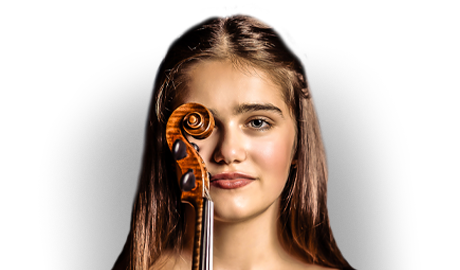A story of humility and perseverance ended last year with Milan Kostelenec becoming the absolute winner of the Kocian Violin Competition. For six years, he has been collecting partial successes, patiently taking one step at a time to the very top. The audience at Kocianka especially appreciates such laureates and warmly welcomes them. Before his departure to Ústí and the Thursday concert at the Roškot Theatre, the student of the Prague Conservatory gave us an interview. The café in Vinohrady was a couple of metro stops away from his school.
Exactly one year has passed since the Laureate success; how do you remember those moments?
I love recalling them. I have many photos displayed at home; they are adorable and emotional. I’ve been coming to Kocianka for a long time, and I want to revisit those memories all the time. I enjoyed it very much.
But after six years of competing every year, it’s suddenly over. Is it any different?
Of course, something is suddenly missing this year. I have been preparing every year… I am preparing for the concert, of course, but I will not compete anymore. And it’s completely different. It’s not as intense this year, which I’m a little bit sorry about. But at least I’ll be back in Ústí. I was always excited when arriving at Ústí; the anticipation was just in the air.
Do you have a memory of Ústí that you like to look back to?
The first year, I came to Ústí with the idea that it would be everyone for himself; everybody would go for the win, and rivalry would prevail. Suddenly, I found that even those who competed against me were very friendly, and in the end, I made the most friends at Kocianka, and we still talk and write to this day. And then, of course, last year, that’s a highlight.
So, is Kocianka a place where relationships are formed for life?
I’m sure it is. For example, just from last year’s edition, I still write with Denis Ryabolov from the USA and, of course, Lana (Zorjan, 2022 laureate), and I text practically all the time. I’m also in contact with Viola Lukášová, but a lot of foreign contestants, too. I’ve also had texted with Batbyamba Jambalbayarnyam from Mongolia; I looked forward to seeing him every year. Kocianka always brings friendships, exceptionally long-lasting ones.
Do you overcome language barriers thanks to music?
Yes, definitely. I am not very talented in languages, though I do enjoy them. But Lana, texting and calling with her, and meeting each other made me start learning extra. So we could talk, not just about music, but about everything. That’s really pushed me a lot.
What is to be said about your choice of repertoire last year? Was Last Rose of Summer your idea?
Firstly, I want to talk about my choice in 2022, playing Tchaikovsky. I chose that one because the first time I was at Kocianka, Lucilla Rose Mariotti won, and she played the Tchaikovsky concerto. And I loved it so much; I didn’t know there was such a lovely thing until then, and I’ve been dying to play it ever since.
And last year’s laureate repertoire?
As for The Last Rose of Summer, Mr. Matěják told me about it. His son won the title of Kocianka laureate with it. I started listening to the song and found it challenging, but the melody was beautiful. So I asked Mr Matěják and Mr Fišer if I could play it. They were both a bit nervous at the time, but we tried. And it was great.
Considering the challenging piece, was the title of laureate the goal?
I decided to enjoy it because I knew it would be the last time at Kocianka. Of course, it would make one happy if it actually worked out. Because it wouldn’t just be an award for me; it would be an award for my parents and professors who worked hours with me and helped me. And that’s what happened.
Is playing at Kocianka any different than other competitions or concerts?
It’s different. At Kocianka in particular, by going there since I was a kid, I was already known by quite a few people over time. And, after all, I never wanted to embarrass myself. So, the expectations were a bit different.
Are your musical role models helping you in this effort? Do you have any?
Musically, it’s my dad, who also plays the violin. From a very young age, he told me that romantic songs are not always only about technique but that I can put my own feelings on them. What I, as a musician, would play. And then my professors, because they are wonderful, both excellent teachers and leading professors in the Czechia. In my endeavour with the Rose, it was Mr Mateják’s son. And overall, Jascha Heifetz is definitely my biggest role model.
In the winter, you went to Serbia to see Lana Zorjan and played two concerts together. Do you have any other plans?
Lana and I have a lot lined up this year. She’s coming to Czechia with me to the Pavel Šporcl Academy during the holidays, and then we’re going to Turkey together, where we’ll have a concert with the orchestra. So those are our plans so far.
Do you meet anyone else from Kocianka?
Of the international participants, I do not, but with Czech ones, I do. For example, Honza Cerman, Violka Lukášová, and Lenka Filipová. Violka, Honza and a few other participants were with me on Václav Hudeček’s courses; many are also from Prague, so we met in Prague at concerts…
Apart from the concerts in Serbia, what have you done in the last year?
For example, considering orchestra playing, we went to Germany. I really enjoy playing with orchestra when I have the time. I can play the things I’m listening to. Things like Romeo and Juliet, Fifth Symphony, and Vltava are just things I listen to on the subway with headphones.
I love film music too; it’s beautiful. I have the opportunity to play it sometimes in Prague at the Rudolfinum. Even a classical composer shouldn’t be tied to one genre.
Cimbálka (a traditional Moravian music band) is a family business and treasure. How did it all start?
I associate Cimbálka with the time I started playing the violin. When I was about three or four, I was with my parents in Velké Březno, and I watched my dad play the violin, which I loved. So I picked sticks out of a rhododendron, which led to the castellan being angry with me, but I pretended to play the violin with them and was happy. That led to my dad buying me a violin for my sixth birthday, and he started playing with me and later I went to Mr. Matěják.
So, did you start playing at the age of six?
Many kids start playing much earlier, but it was better for me. I was no longer at the age where I just wanted to play; I was already aware of my responsibilities and could concentrate on the violin.
We approached your beginnings; what are your plans for the future?
We’ve been looking for another opportunity to compete, so I’d like to attend a competition in Poland, Poznan. Then also in Italy. Also, the school has nominated me for Eurovision, so I was with Mrs. Hájková (the accompanist for the Kocian Violin Competition) at the Kavčí hory in Czech Television for a casting. I have concerts with Lana coming up, there’s a lot to do.


